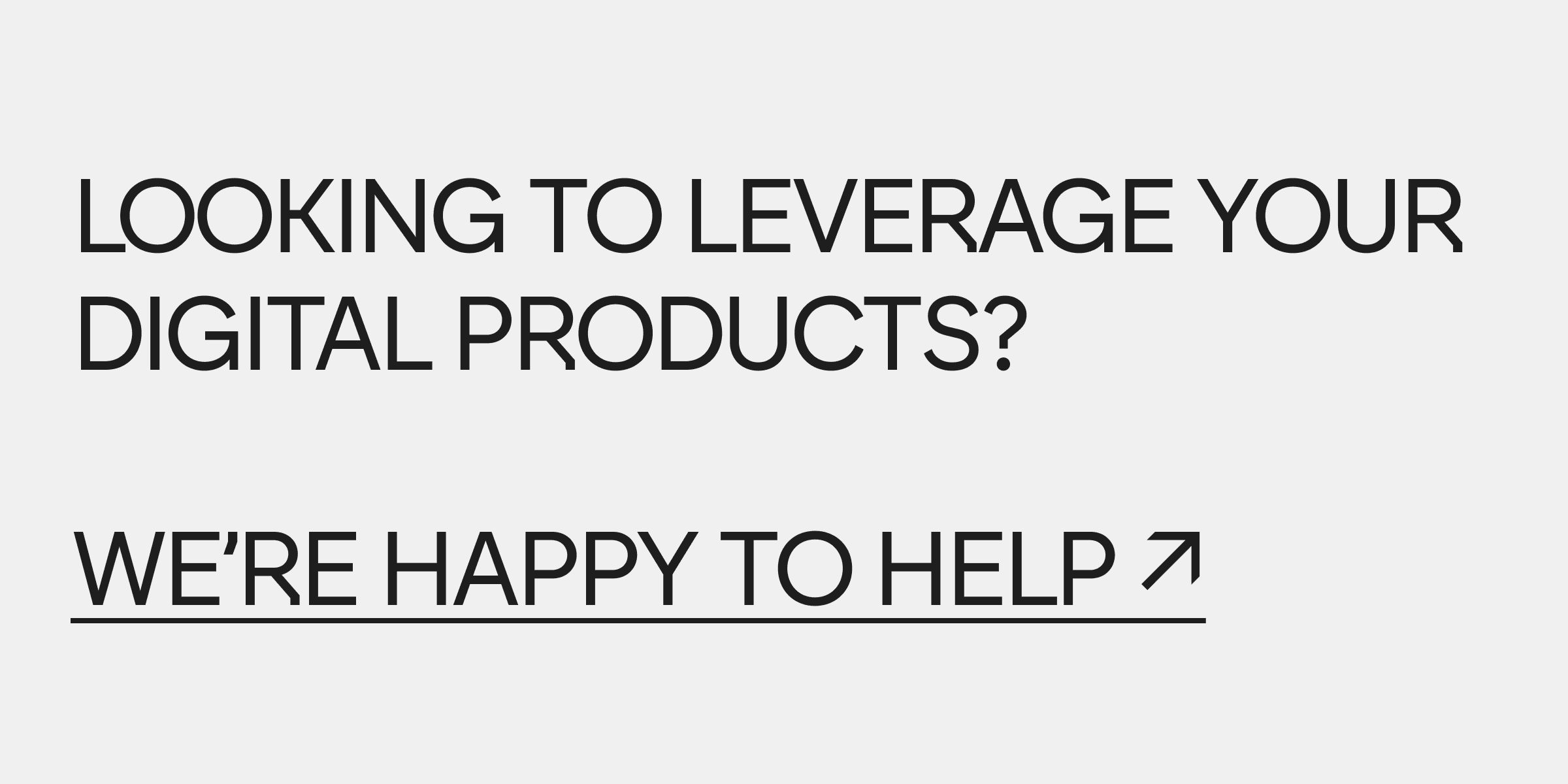Creating a Digital Product? Here’s What To Consider!
Launching a new digital product onto the market is by no means an easy task. It’s a complex process to create digital products, and many things will go wrong if you don’t plan properly. To ensure a smooth and effective launch, consider using a digital product launch checklist to cover all necessary steps.
Tens of thousands of various types of digital products are launched annually, but just a fraction of these products succeed. That’s no coincidence. Successfully launching a digital product is a skill, and it goes beyond finding its unique selling point, paying for marketing, and following other generic pieces of advice you might see online.
Don’t get it twisted - focusing on your goals is a great piece of advice, and doubling down on what matters is a sure way to eliminate things that may distract you from doing the important stuff. But make sure to focus on what’s truly important, and you’ll quickly see that launching your digital product won’t be that much of an issue for both you and your team.
Regardless of what kind of work you want to show the world, here are some top challenges of successfully launching a digital product.
Understanding Digital Products
What is a Digital Product?
A digital product is an intangible piece of media or an asset that is sold or distributed online, consumable regardless of device used. Unlike physical products, digital products exist in the virtual realm and can be accessed through electronic devices. These products range from software applications and e-books to online courses and digital art. The rise of digital products has been fueled by their ease of creation, distribution, and accessibility, making them a popular choice for both creators and consumers. Whether it’s a comprehensive online course or a beautifully designed piece of digital art, digital products offer endless possibilities for innovation and creativity.

Benefits of Digital Goods
Digital products offer numerous benefits to both creators and customers. For creators, they provide a low-cost and low-risk way to bring products to market. There’s no need for physical storage, shipping, or significant overhead costs, which means creators can focus more on the quality and innovation of their products. For customers, digital products offer unparalleled convenience and flexibility. They can be accessed and used from anywhere with an internet connection, making them ideal for today’s fast-paced, on-the-go lifestyle. Whether you’re downloading an e-book for a long flight or accessing an online course from the comfort of your home, digital products make it easy to get what you need, when you need it. Additionally, creating a profitable digital product can lead to significant financial success for creators.
Examples of Digital Products
The world of digital products is vast and varied. Here are some common examples:
- E-books and Audiobooks: Digital versions of books that can be read or listened to on electronic devices.
- Online Courses and Tutorials: Educational content delivered through the internet, allowing users to learn new skills at their own pace.
- Digital Art and Graphics: Creative works that are created and shared digitally, including illustrations, animations, and graphic designs.
- Software and Mobile Apps: Programs and applications designed to perform specific tasks on computers and mobile devices.
- Digital Templates and Design Tools: Pre-designed templates and tools that help users create professional-looking documents, presentations, and graphics.
- Photography and Stock Images: High-quality images that can be purchased and used for various purposes, from marketing to personal projects.
- Virtual Reality Experiences: Immersive digital environments that can be explored using VR headsets.
These examples highlight the diversity and versatility of digital products, catering to a wide range of interests and needs.

Understand Your Target Audience
It’s alright to believe that you’ve built the best possible product. Still, you’ve got to understand that you and your team created it for the users. It’s them who will decide whether your innovative product will be a success.
Here come the big questions. Who are your users? What do they want? Answering these questions is not enough. To launch a product successfully, you need to act upon your findings. If you create a digital product for everybody, it will be loved by nobody. Unfortunately, most entrepreneurs learn that the hard way, but you’re not one of them. That’s why you’re here, ready to leverage customer feedback to refine your product.
As you’re creating a digital product, make sure to look at it from the perspective of the user to understand who you’re creating it for. You’ve got to think like your digital product’s users and develop an emotional connection with them in order to see what they will look for in the digital product you’re about to introduce to the world.
Also, before releasing the product, the company should first use it in-house. This way, they will have a first-hand experience of how their product works, which will enable them to better address their users’ needs. Regardless of how fancy the technology behind your product is, its users and their needs should always come first. Simply put, companies that prioritize their users before intricate and overly-complicated technology almost always get it right.
Prioritizing customer satisfaction by continuously adapting your product based on user feedback can significantly enhance user experience and loyalty.
Making space in your project for product experience analysis is vital in understanding your users. Once the product is released, there are still ways to apply fixes and updates based on user-generated data. But for that data to mean anything, you have to prepare the product beforehand. Ask yourself how your users use your product. Better yet, give them an easy way to express their thoughts on the way it functions!
Tracking the user’s behavior is relatively easy. You’ve just got to come up with how to measure in-app activity. The problem lies in knowing how the user feels about the product experience. With that in mind, providing a simple-to-use and easy-to-understand user feedback feature is a must. You’ll be surprised by the amount of valuable feedback you can get this way!
Use Your Resources Wisely
Deciding on how to allocate their resources is a challenge for anyone who is looking to build and launch a digital product. That includes even the most skilled of project managers! The importance of establishing a project’s framework and scope of operation should never be undervalued. In today’s age, it makes sense to provide the client with an option to meet up remotely, either through a video or audio call. Talking through the most important parts of a project, whether it happens face-to-face or online, effectively prevents you from wasting time on having the client explain who they are and what they need in a lengthy email.
Leveraging social media platforms can significantly increase visibility and engagement with potential clients, making them an essential tool for promoting digital products. Additionally, having dedicated customer service teams to handle inquiries and provide support post-launch is crucial for ensuring customer satisfaction and retention.
Let's say you want to dive into the world of e-commerce. You've got to figure out which e-commerce platform will work best for your business. If you’re serious about your venture, going for the wrong platform, or failing to set one up in a timely or cost-effective manner, is a recipe for disaster. In other words, it’s a surefire way to waste your resources in the long run. That’s why it’s always a smart decision to ask a professional digital product agency for help.
Read also: 10 E-Commerce Mistakes That Are Killing Your E-Commerce Conversion Rate
Embrace Feedback
For creators of digital products, receiving feedback is necessary if they want to discover what to focus on. When launching a new digital product, you will most likely get feedback from the stakeholders, client company’s employees, investors, quality assurance specialists, and other parties involved.
Taking suggestions, opinions, and sometimes even criticism is an important skill, no matter if you’re a Project Manager, a Designer, or a Developer. At the same time, being able to write a reasonable response and defend your methodologies, design ideas, or coding solutions, is of equally high importance, and it takes dedication and experience to hone this skill.
Getting feedback is the easy part, though. You’ve got to act on it. You could do so by, for instance, establishing a list of action points and priorities. Finally, while it’s on the Project Manager to make the final call, make sure you listen to all the parties involved in your project. And that involves going through all the feedback and sharing feedback-based input with your team, sometimes many times over.
You should always remember that in the end, your product is built to suit the customer’s needs, and as such, their feedback is of great importance. By embracing customer feedback and turning their suggestions into reality, you will be able to greatly improve your product and develop a better offering that meets both the market’s and the stakeholder’s demands, ensuring a successful product launch.
Dive into our article if you want to know more about how to give design feedback!

Find the Right People
With the right team, you are more likely to create the right product. In the business world, nothing beats assembling a symbiotic group of like-minded, inspired people who are ready to invest their energy and enthusiasm into a professional digital product. Finding the right people is, however, a huge task. It's arguably the biggest challenge any Founder or Project Manager will face — it could be the one thing that makes or breaks your product launch.
Read more: How To Choose a Web Design Agency in 2025?
Let's say you want to build a website for your business. The first step is to find a team with a proven website design and development process. The team should include skilled Web Developers, UX/UI Designers full of creativity, and, of course, a talented Project Manager to handle the direction of the project and its more general aspects. If you've got a solid hiring process, you could look for these professionals individually and get them to work on your project in-house. Alternatively, you could opt for an established agency like us to handle everything for you.
Going with an agency has its advantages. First, you'll be sure that veteran talents will handle the job, and that you won't have to go through the stress of managing everything yourself. If you give us a try, all you've got to do is have a call with our CEO Kuba Luty to discuss your project details. The time frame, budget, and everything in-between will be agreed up before your project begins for maximum transparency.
Conduct Thorough Market Research
When it comes to digital product launches, focusing on your area of expertise is of utmost importance. Despite the ambitious ideas of aspiring Projects Managers who wish to launch a product that everyone in the world will like, having a niche will help develop a deep connection with your users. And if you’re just as passionate about your product as your audience, then you know you’ve hit the bullseye. Thorough market research is essential in identifying your target audience, analyzing competition, and refining your marketing strategies.
Niches are another opportunity where a professional digital product agency will be of great help. Based on your input, we will be more than happy to help you find the niche that’s aligned with your company’s mission, goals, and values. This way, your new digital product will be discovered by niche-specific sponsors, influencers, advertisers, and marketers, which is great for business and product life.
In general, most of the decisions that revolve around your product will be dependent on your niche of choice. Decisions regarding product pricing and marketing can easily be established based on adequate research.
All in all, going for a specific niche isn’t something that you should overlook, as creating and launching a digital product that’s not niche-specific is akin to creating a product designed to be liked by every single person in the world. As a result, it’s very unlikely to succeed.
Defining Your Goals and Objectives
Defining your goals and objectives is a crucial step in creating a successful digital product. It involves asking yourself questions such as “What problem am I trying to solve?” or “What value will this provide my customers?” Answering these questions will help you create a clear vision for your digital product and ensure that it meets the needs of your target audience.
To define your goals and objectives, start by identifying your target audience and their pain points. What are their needs and desires? What problems are they trying to solve? Once you have a clear understanding of your target audience, you can start to define your goals and objectives.
Your goals and objectives should be specific, measurable, achievable, relevant, and time-bound (SMART). For example, “I want to create a digital product that helps entrepreneurs launch their own online courses” is a specific and measurable goal. “I want to make $10,000 in sales within the first month of launching my digital product” is a measurable and achievable goal.
By defining your goals and objectives, you will be able to create a clear roadmap for your digital product and ensure that it meets the needs of your target audience.

Establishing Pricing and Payment Options
Establishing pricing and payment options is an essential step in creating a successful digital product. You need to consider how much to charge for your product and how you will accept payments.
When determining the price of your digital product, consider the value it provides to your customers. What are they getting in return for their money? How does your product compare to others in the market? You should also consider the costs of creating and delivering your product, such as development costs, marketing expenses, and customer support.
There are several pricing models you can use for your digital product, including:
- One-time payment: Customers pay a single fee for access to your product.
- Subscription-based: Customers pay a recurring fee for access to your product.
- Tiered pricing: Customers can choose from different pricing tiers, each with different levels of access to your product.
When it comes to payment options, you should consider using a secure and reliable payment gateway. Some popular payment gateways include Stripe, PayPal, and Authorize.net. You should also consider offering a free trial or demo of your product to give customers a taste of what they can expect.
By establishing pricing and payment options, you will be able to create a clear and transparent sales process for your digital product.
Building a Sales Page
Building a sales page is a critical step in creating a successful digital product. Your sales page is the first impression potential customers will have of your product, and it needs to be compelling and persuasive.
When building your sales page, consider the following elements:
- Headline: Your headline should be attention-grabbing and clearly communicate the value of your product.
- Subheadline: Your subheadline should provide more information about your product and its benefits.
- Product description: Your product description should clearly explain what your product is and how it works.
- Testimonials: Testimonials from satisfied customers can help build trust and credibility with potential customers.
- Call-to-action: Your call-to-action should be clear and prominent, encouraging potential customers to take action.
Your sales page should also be visually appealing and easy to navigate. Use high-quality images and graphics to showcase your product, and make sure your page is optimized for mobile devices.
By building a compelling sales page, you will be able to effectively communicate the value of your digital product and persuade potential customers to take action.
Marketing Strategy and Promotion Plan
A marketing strategy and promotion plan are essential for creating a successful digital product. You need to have a clear plan for how you will reach and engage with your target audience, and how you will promote your product to them.
When developing your marketing strategy and promotion plan, consider the following elements:
- Target audience: Who are your ideal customers, and what are their needs and desires?
- Unique selling proposition (USP): What sets your product apart from others in the market?
- Marketing channels: What channels will you use to reach and engage with your target audience, such as social media, email marketing, or paid advertising?
- Content marketing: What type of content will you create to promote your product, such as blog posts, videos, or podcasts?
- Influencer marketing: Will you partner with influencers in your industry to promote your product?
Your marketing strategy and promotion plan should be tailored to your specific product and target audience. By having a clear plan in place, you will be able to effectively promote your digital product and reach your target audience.
Logistics and Distribution Planning
The hosting platform you select should be capable of handling a large volume of customers, providing secure payment processing, and offering seamless integration with e-commerce platforms. Some popular hosting platforms for digital products include:
- WordPress: A versatile platform that offers a range of plugins and themes to customize your digital storefront.
- Shopify: Known for its robust e-commerce capabilities, Shopify is ideal for selling digital products alongside physical goods.
- Gumroad: A user-friendly platform that simplifies the process of selling digital products directly to customers.
- Sellfy: Offers a straightforward solution for creators looking to sell digital products, with features like instant payouts and marketing tools.
- Easy Digital Downloads: A WordPress plugin specifically designed for selling digital products, providing a seamless experience for both creators and customers.
When choosing a hosting platform, consider factors such as cost, scalability, customer service, and ease of use. It’s also essential to ensure that the platform is secure and reliable, with features like SSL/TLS encryption and regular backups. By selecting the right hosting platform, you can provide a smooth and secure experience for your customers, setting the stage for a successful digital product launch.
Post-Launch Evaluation and Improvement
After launching your digital product, it’s essential to evaluate its performance and make improvements. This will help you refine your product and marketing strategy, and ensure that you’re meeting the needs of your target audience.
When evaluating your digital product, consider the following metrics:
- Sales: How many sales have you made, and what is your revenue?
- Customer satisfaction: How satisfied are your customers with your product, and what feedback are they providing?
- Customer retention: How many customers are returning to purchase from you again, and what is your customer retention rate?
- Marketing effectiveness: How effective are your marketing efforts, and what channels are driving the most sales?
Based on your evaluation, you can make improvements to your digital product and marketing strategy. This might involve refining your product features, adjusting your pricing, or changing your marketing channels.
By continuously evaluating and improving your digital product, you will be able to create a successful and sustainable business that meets the needs of your target audience.
Read also: Why Your Site Needs a Monthly Maintenance Service?
for an Agency That Builds With You, Choose Adchitects!
These days, it isn’t enough just to have a custom URL and a bare-bones website. Instead, you need a reliable, responsive, and conversion-oriented platform that’s as engaging to your customers as it is effective for your business.
That’s where Adchitects come in.
As a world-class provider of digital products for businesses of all kinds, we’re uniquely suited to deliver compelling solutions for all your digital needs. With an agile, highly collaborative process at the core of our company, we will provide you with the digital solution you need.
Now, are you ready to get started?
Reach out to us today, and let's build something together!







